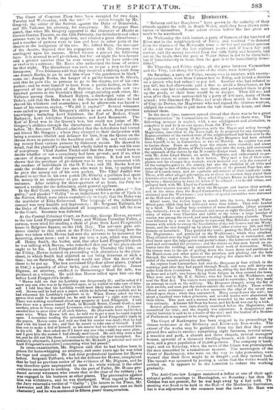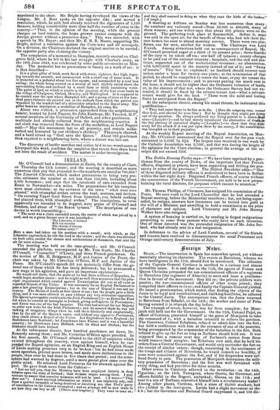gbe iBrobinres.
" Rebecca and her Daughters" have grown in the audacity of their crusade against the tolls in South NVales, until they have drawn retri- bution on themselves. Some minor events before the last great act merit to be mentioned.
On Wednesday the 14th instant, a party of farmers of the hundred of Elvet met in the neighbourhood of Talo;:, and resolved " to demand from the trustees of the Newcastle trust a de.tor and creditor account of the said trust for the last eighteen ears ; and if found fair and correct, and the money received from the tolls fairly and honestly laid out on the roads, then the gate at Water Street is not to he disturbed ; but if Unsatisfactory to them, then the gate is to be immediately demo- lished."
On Thursday and Friday nights, all the-gates between Carmarthen and the Tivy, and along the banks of the river, were destroyed.
On Saturday, a party of Police, twenty-two in number, with twenty- eight pensioners, went from Carmarthen to Talog, and levied a distress on a person who had refused to pay toll. Another who had refused to pay toll, but had afterwards paid a fine to avoid a disturbance, as his wife was near her confinement, met them, and persuaded them to giv* up the goods, or their lives would be in danger. They did so ; and soon after they were surrounded by a party of 400 men, many of them armed ; who disarmed the Police, and made them march to the house of Captain Davies, the Magistrate who had signed the distress-warrant, obliged the constables to pull down the wall round the house, and then released them.
In the mean time, rumours spread abroad that there was to be a great " demonstration " in Carmarthen on Monday : and so there was. The following account is copied, with s axle abridgment and alteration, to complete it and fit it to our space, from the Times— A large body of County Magistrates, with the Mayor and acting borough Magistrates, assembled in the Town-hall, to be prepared for any emergency. Representations of the excited state of the neighbourhood had been sent to the Home Office ; and a troop of the Fourth Light Dragoons bad been ordered from Cardiff, to be in Carmarthen at two on Monday. An express was sent to hasten them. From an early hour the streets were crowded; and about ten o'clock, Captain Evans, of Penlykendy, rode into the town, and announced the approach of the rioters by the Newcastle-Emlyn road. He then rode hack with Mr. John Lloyd Davies, an active Magistrate, and endeavoured to per- suade the rioters to return to their homes. They read a list of their com- plaints and the changes they desired ; which included not only the removal of all the turnpike-gates in the county, but also the abolition of all tithe and rent-charge in lieu of tithes, the total alteration of the present Poor-law, abo- lition of Church-rates, and an equitable adjustment of their landlords' rents. These, with other alleged grievances, six or seven in number, they stated their determination to get remedied. They asked Captain Evans to lead them into the town ; threatening to burn his house if lie refused ; but he did refuse, and galloped back with Mr. Lloyd to Carmarthen.
Another express was sent to meet the Dragoons and hasten their arrival; and in the mean time the Royal Carmarthen Fusileers were called out and stationed near the Workhouse ; and bodies of special constables were stationed at the Hall and at other points.
About noon, the rioters began to march into the town, through Water Street gate, which they had destroyed some time before. They were headed by a band. The leading body consisted of some thousands, [other accounts say, variously, two or three thousand, and seven or eight thousand,] on foot ; many of whom were Chartists and rabble of the town : a large number of women was among the crowd, and men bearing inflammatory placards. These were followed by a man in disguise to represent Miss Rebecca ; some bearing brooms with which to sweep the foundations of the toll-houses and the Work- house, and the rear brought up by about 300 [other stories say 500, and 900] farmers on horseback. They paraded the town : passing the Hall, and hooting the Magistrates; and proceeded to the Workhouse ; which they attacked. They climbed over the high wall with which the building is surrounded, and then burst open the lodge-gates and porter's-door; the horsemen rode into the yard and surrounded the premises ; and the rioters on foot soon forced an en- trance into the building, and commenced their work of destruction. While the rioters were in the act of pulling down the inner doors and partitions of the Board-room and other parts of the premises, and pitching out the beds through the windows, the Governor was ringing the alarm-bell ; and in the midst of the tumult arrived the military. An express from Carmarthen had met the Dragoons at four o'clock in the morning, just after they had passed through Neath, and were still thirty-one miles from their destination. They pushed on, riding the last fifteen miles in an hour and a half; two horses dying from fatigue as they entered the town. They were met by Mr. T. C. Morris ; who led them to the Workhouse, and read the Riot Act. The rioters were summoned to surrender ; but they made an attempt to rush on the military. The Dragoons charged, using the fiat of their swords, and soon put the rioters outside the wall to flight. Those within offered some resistance ; and for a few moments the edge of the sword was turned upon them; when they succumbed. Many escaped over the wall ; but about a hundred were taken prisoners, and several horses were abandoned by their riders. Two men and a woman were wounded by the swords, but not very seriously. A. farmer fell from his horse, and his head was cut by a kick. Several prisoners were immediately examined before the Magistrates, and committed for trial; and the inquiry was adjourned. A disappointed pro- vincial barrister is said to be a leader of the riot ; and the brother of a Member of Parliament is supposed to be among the prisoners.
The Court of Bankruptcy has been stopped in its proceedings by riotous resistance at the Sirrbowy and Ebbw-vale Iron-works. The extent of the works may be gathered from the fact that they cover ground five miles in extent; comprising eight furnaces, several mines, a mansion and park, a church and three chapels, several managers' houses, upwards of a thousand dwelling-houses, with 3,400 working men, and a gross population of 11,000 persons. The company is bank- rupt; and on Saturday, when the news of the failure was promulgated, the men assembled in a tumultuous manner. The messengers of the Court of Bankruptcy, who were on the way to take possession, were warned that their lives might be in danger; and they turned back. The tumult was appeased by posting a notice that the works would be carried on. It appears to be the intention to reduce the working gradually.
The Anti-Coro-law League sustained a defeat at one of their agri- cultural public meetings in Huntingdon, on Saturday ; but then Mr Cobden was not present, for he was kept away by a bad cold. Th meeting was fixed to be held in the Hall of the Mechanics Institution, but it was adjourned to the common near the town. Mr. Rust was
appointed to the chair. Mr. Bright having developed the views of the League, Mr. J. Rust spoke on the opposite side ; and moved a resolution, which, be said, had already received the signatures of 1,100 farmers, holding considerably more than half the number of acres in the country—" That, in the opinion of the meeting, while the present charges on land remain, the home grower cannot compete with the foreign grower without a protective duty." This was seconded, with a speech by Mr. Boyer; and then Mr. R. R. R. Moore, supporting Mr. Bright, moved a resolution against the Corn-laws and all monopoly. On a division, the Chairman declared the original motion to be carried ; the opposite party also claiming the victory.
The completion of a memorial to Hampden, recently erected on Choi- grove field, where he fell in his last struggle with Charles's army, on the 18th June 1843, was celebrated by some public ceremonies on Mon- day. The memorial has no pretensions to beauty as a work of art : it is thus described— It is a plain pillar of brick-work faced with stone, eighteen feet high, taper- lug towards the summit, and surmounted with a small cap of stone-work. It is mounted on a pedestal about ten feet square, and surrounded by a neat iron railing; the whole being erected on a mound of turf, slightly raised above the surrounding fields, and enclosed by a small fosse or ditch containing water. The point of land on which it stands is the junction of the four cross-roads to the village of Chalgrove, Oxford, Hazeley, and Wallingford. It is supposed to be erected near the spot where Hampden fell ; and a group of trees at few hun- dred paces distance are pointed out as the ambush from which the patriot was wounded by the musket-ball of a skirmisher attached to the Royal army. The pillar bears an inscription, a medallion of Hampden, his arms, &c. About two o'clock, a procession approached from the neighbouring hamlet, headed by Lord Nugent, Sir John Easthope, Mr. Tancred, M.P., several members of the University of Oxford, and other gentlemen. A multitude had already collected from the neighbouring counties. A sail cloth was removed from the front of the medallion, as Lord Nugent said—" May this monument last to all posterity, and remain undis- turbed and honoured by our children's children." The people cheered, and a band struck up " God save the Queen." About 160 gentlemen then repaired to a neighbouring barn, where a dinner was laid out.
The discovery of lucifer matches and cotton lard in two warehouses at Liverpool this week, confirms the suspicion that recent fires there have not been the result of accident. The matter is under investigation.



























 Previous page
Previous page